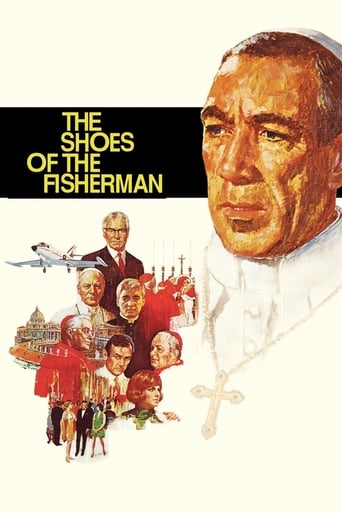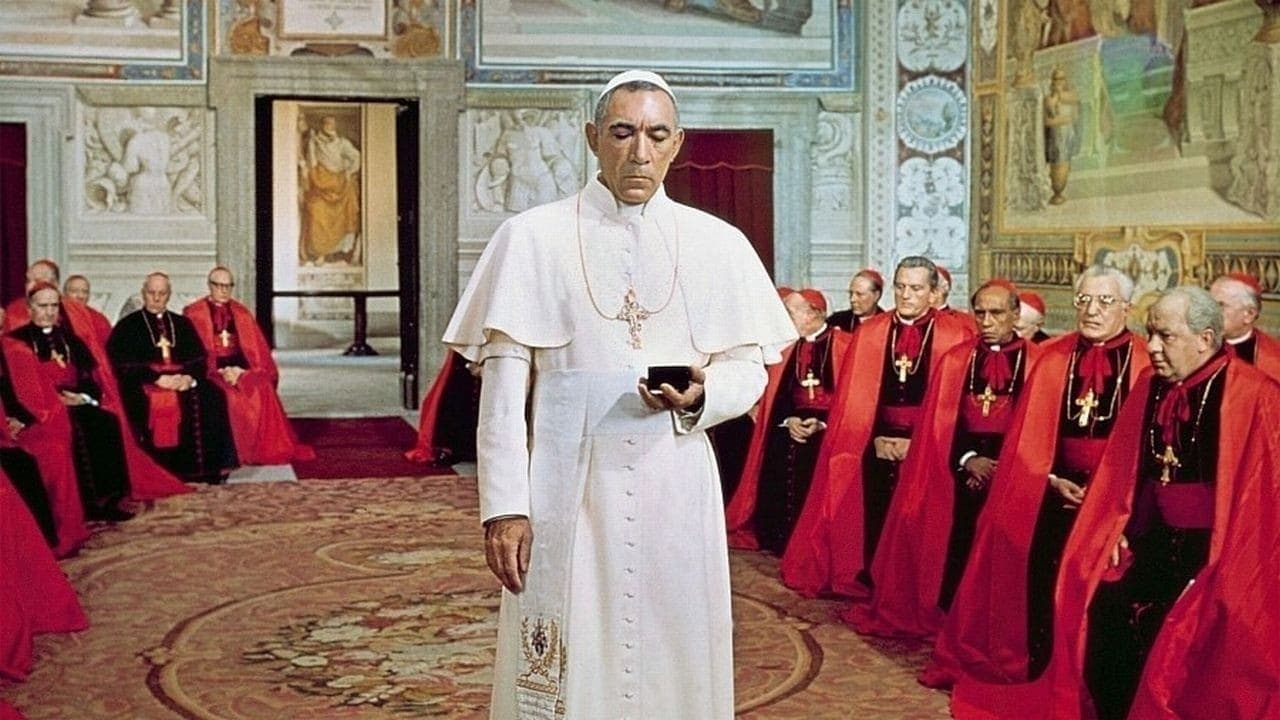Filipe Neto
Kiril Lakota is a Soviet Catholic Archbishop which is elevated to cardinal after years in a Siberian penal colony, managing to be elected pope shortly after. Consumed by his own insecurity, he will have to deal with a divided church and a changing world. Directed by Michael Anderson, this epic film has a screenplay by John Patrick and James Kennaway. The cast is headed by Anthony Quinn, Vittorio De Sica and Laurence Olivier.For the most inattentive viewer, this film will seem just a tour through the ancient Catholic liturgy, prior to the Second Vatican Council. Masses in Latin, priests back to the community, a huge imperial solemnity and majestic surrounding the Pope... But this film can be much more than that. Its a journey across the soul of a man who chose to be true to his faith and his ideas, supporting the price of that and not letting down by loneliness, hunger or the whip.The script is excellent and it was done carefully, as well as the dialogues, which have something philosophical and profound. However, the film elongates too much in Catholic liturgical ceremonies, making it too overwhelmed, as if the audience had gone to attend a Mass and not a movie. I think this part of the film is important and needs to be displayed and explained, but could have been shortened, even though that time was then wisely spent in an attempt to deepen the plot around the Chinese crisis or the sub-plot surrounding George Faber's marital life. This plot was so sadly inserted that ends up clashing the movie, as if it had been fitted to the hammer. The editing of the film could also have been better, seeming illogical and disorderly at several times.The actors met very well with their roles, but there are two that deserve all the highlight: Oskar Werner shone in the role of Father Telemond, a philosopher priest, freethinker, contrarian and almost subversive, portraying very well the divisions within the Church that had led to the Second Vatican Council (closed a few years before this film was shot); and of course, Anthony Quinn, an actor who achieved in this film, perhaps, one of the most remembered works of his career.The soundtrack, by Alex North, was excellent and is worthy of being remembered. The costumes fulfilled their role correctly and without errors.A very curious fact: this film was inspired by Morris West's novel, with the same name, written in 1963. As this film, the novel spoke about the election of a Soviet pope. Coincidence or not, in 1978, was elected John Paul II, Cardinal Archbishop of Krakow, a Polish city integrated in the Soviet Union at that time.
GusF
Based on the 1963 novel of the same name by Morris West, it tells the story of a Ukrainian archbishop named Kiril Lakota who, after being released from 20 years imprisonment in a Siberian labour camp, is elevated to the Cardinalate. He does not want the position, begging Pope Pius XIII for "a simple mission with simple people," but it is essentially forced upon him. When the Pope dies, Cardinal Lakota is elected to succeed him and even more reluctantly accepts that position, taking the papal name Kiril I. In the meantime, the world is on the brink of full scale nuclear war due to a breakdown in Sino-Soviet relations exacerbated by widespread famine and starvation in China.Anthony Quinn is simply marvellous as the brilliantly characterised Pope Kiril, a man of great intelligence, wisdom, compassion and dignity. In a wonderfully understated performance, he plays the new Pope as a quiet, contemplative man who cares deeply about the world and its people, Catholic and otherwise. He finds being called to fill the shoes of the fisherman not only a daunting task but a lonely one too. Feeling cut off in the Vatican, he has his personal aide find him the black cassock of an ordinary priest so that he might walk through the streets of Rome in disguise, something which may have been inspired by "Henry V". Tending to a Jewish man on his deathbed, he recites the Kaddish which he learned from a rabbi in the prison camp. He is a true man of the people.Laurence Olivier is typically excellent as Kiril's former jailer Piotr Kamenev, who has likewise moved up in the world as he has become the Soviet premier. Another very strong character, he was presumably named after the early Soviet politician Lev Kamenev. By no means another Stalin, he is an intelligent and pragmatic, though conservative, Communist. He has no more desire for nuclear war than anyone else. As he realises that the Pope can influence millions of voters in the Western democracies, he seeks his assistance in mediating talks with China's leader Chairman Peng. Olivier has relatively little screen time but commands the screen whenever he appears on it and he has great chemistry with Quinn.It has an excellent cast overall: Oskar Werner as Father David Telemond, who becomes Kiril's closest friend but is silenced by the Vatican for his heretical views; Leo McKern as Cardinal Leone, who often disagrees with the Pope's decisions; Vittorio De Sica as Cardinal Rinaldi, who proposes Kiril's election to the papacy and who sadly disappears from the film after its first half; David Janssen as George Faber, the Rome correspondent for an American TV network who doesn't take "Thou Shalt Not Commit Adultery" too seriously; Barbara Jefford as his long-suffering wife Dr. Ruth Faber; Burt Kwouk as Chairman Peng, one of his most serious roles; and, in a fantastic cameo, the great John Gielgud as Pope Pius XIII. It has also nice appearances from Clive Revill, Niall MacGinnis and Marne Maitland in small roles, though Frank Finlay is atypically bad in his one scene role as Igor Bounin.The film benefits hugely from its top-notch script. It is filled with great characterisation and the dialogue is beautifully written. It is an extremely intelligent film which does not condescend to its audience. Much of the film concerns the internal politics of the Vatican, very much a world onto itself, as well as the Vatican's role in the politics of the outside world. It also features a fascinating examination of Christianity in general and Catholicism in particular through Father Telemond's unorthodox beliefs. Kiril's relationship with him is the most interesting part of the film. The Sino-Soviet subplot is extremely effective. On the other hand, the (unresolved) one concerning the Fabers' failing marriage is the least interesting part of the film but it's still well done. It is very, very well directed by Michael Anderson, who gives the material a suitably epic feel. Shot entirely in Rome, the film made excellent use of the beautiful scenery of the Eternal City but, at the same time, it was not afraid to show its underbelly in the scenes where Kiril visits one of the poorest parts of Rome while disguised as a priest. They don't make them like this anymore, I'm afraid.
inspectors71
And if you don't read Latin, that summary ain't a compliment. This elephantine blob of dullness is enough to drive the faithful right out the front doors of their parish church. How anyone can take a cerebral story of a prisoner of faith in the Soviet Gulag who rises to the pinnacle of the Roman Catholic Church as Pontiff and turn it into 160+ minutes of ponderous, tedious banality deserves a special Mass.But first, about a thousand Our Fathers and Hail Marys. Michael Anderson's production sucks almost every drop of humanity out of Morris West's book. THE SHOES OF THE FISHERMAN fails miserably where Allen Drury's--and Otto Preminger's--ADVISE AND CONSENT, succeeded in showing the internecine workings of the U.S. Senate. The viewer never really believes he's watching the elevation of a Ukrainian bishop to Cardinal, then Pope. It's just Anthony Quinn looking horrified at the prospect of being in another scene. And on and on.The cast--and the viewers, for that matter--serve an interminable penance for sins undetermined, and non-Catholics must wonder why all the loyalty to the Church by its members.The next time you really screw up, watch the movie. It's worth at least 3,000 Our Fathers.
movie-viking
A pretty good movie...You have to understand...All popes were Italian--until Karol Wojtyla was elected in the late 70s as Pope. The former Wojtyla...survived both the Nazis and the Communists.Thus, this movie's fictional Pope has much in common with the real life first non-Italian Pope - Karol Wojtyla - also from a then-communist country--Poland.At the Vatican, the cardinals (in their desperation to reach a vote---and to elect a Pope who would be a good leader) elect the new Cardinal from then-communist Russia - former Ukranian Prisoner ##102592R - Kiril Pavov Lakota...who had served 20 years in a Siberian labor camp (later called "gulags").There are various subplots---described by others here. But the big plot is the threat of nuclear war between the Soviets and the Chinese (who are suffering a huge famine & who might use nuclear weapons).As some Americans are now taught that the "Cold War" was no big deal, this movie's dangerous international situations will no doubt seem fake. But read up (far & wide) the Cold War (and the thread of nuclear war) was real. (I knew a man who said...his plane carried a nuclear warhead!) While some of this movie is a bit too late 1960s---and a touch creaky, maybe this movie will inspire some to research (in multiple places) the AMAZING essentially nonviolent way that Communism fell apart in the Soviet Union & its European satellites.And --in the 1980s---a US President, a British Prime Minister, a Polish working man, ...and a Polish born Pope were the main ones to "tear down the wall"!!!



 AD
AD



